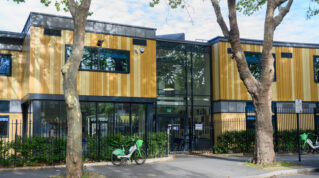Hannah Wilson heads up Aureus School in Didcot, whose strapline is “nurturing hearts and minds”. Stuart Lock runs Bedford Free School, which adopts the “no excuses” approach. We invited them to discuss the differences and similarities in how they manage behaviour.
How do you create your behaviour culture?
Stuart Lock: We’re very routines- and structures-based. We start the day with a talk about our values in the playground, with all the pupils in silence, facing the person who is talking.
Our routines include silent corridors, and pupils have to watch the teacher when they’re talking. We have very firm expectations – our staff “sweat the small stuff”. But we do everything with “purpose, not power”, which means if we can’t explain a routine to parents or pupils, we shouldn’t be doing it.
I think some of our most vulnerable pupils find school calmer than outside, particularly because of the low noise levels, and because very few unexpected things happen. In an anonymous pupil survey, 100% of our pupils said they feel safe in school.
Hannah Wilson: Ours is a values-based approach. We have 12 school values we refer to constantly, then three words: “ready, respectful and safe”, which are catch-alls for everything. Our values underpin the rewards and consequences; we say that if you make a choice to contravene the values, there are consequences.
We start the day purposefully, with mindfulness, so the children go into period one ready for learning. While we don’t impose silence in corridors, we do have an acceptable level of talk in the classrooms versus the corridors.
We have coaching time, which is our tutor time, at the end of the day so the children can unpick the day before they leave the building.
Do you use rewards and sanctions?
HW: We have a 12-step rewards ladder and really high tariffs for our rewards. I’ve worked in schools where people were over-rewarding and it becomes devalued.
SL: We talk about internal motivation, and doing the right thing because it’s the right thing to do.
HW: So you don’t have extrinsic motivation for rewards, but you do for sanctions?
SL: We have a very simple sanction system. They gain a credit for every lesson, and they can also lose them. At the end of the lesson, you mark off your credit in your planner – unless the teacher has your card. So your parents can see you’ve got a credit for every lesson that day. I guess it’s a combination of a reward and a behaviour system.
Do you use detentions?
SL: If our students lose two credits in a lesson, they’re immediately in a 40-minute “correction” the same day. We call it correction, not detention, because it’s about correcting your behaviour.
HW: We don’t do detentions. We do restorative conversations, starting with 40 minutes after school. On a Friday we finish at 1pm and restoration time with deputy heads is 1-2pm. The really unpopular one is once a month on a Saturday morning in school uniform to do a community task with me. That has been really preventative.
SL: You do something that sounds like a detention!
We don’t do detentions
HW: Some of my kids say, “You just use posh words. You’ve just rebranded detentions!” But no, it’s completely different. And when you explain it, they do get it.
SL: But your rhetoric is that it’s effective because they don’t want to do it, not because it’s positive.
HW: That’s a fair challenge. We don’t sit in silence doing sheets. We unpick the behaviour – talk about what went wrong and how we can do it better next time.
SL: We do that! We do readmission meetings for every fixed-term exclusion, and after an isolation we talk through what went wrong and how to stop it happening again. But I wouldn’t choose to invest my senior staff’s time in restoration meetings. My attitude is, let’s get the sanction over and get on with it. I think they’ve just been naughty. I suspect that you think there’s more work to do.
Is fixed-term exclusion a bad thing?
HW: We use the restorative time to try and bring down exclusions. But I think the misnomer is that if you do restorative practice, you don’t ever make those difficult decisions to exclude. We do. We also isolate. But not in a room where you face the wall and get no fresh air all day – ours is more humane.
SL: I think if the pupils weren’t in isolation, we’d exclude them. So if you’re campaigning to get rid of booths, exclusions would go up. Our stats show that isolation has a very strong effect: more than 50 per cent of our pupils don’t repeat any behaviour that gets them into isolation.
I also think sometimes the alternative is that you artificially manage exclusions down, which ends up lowering expectations for everybody. I think we have to be really careful about judging schools. Fixed-term exclusions are a valid way of trying to moderate behaviour.
HW: I agree. We don’t want to be the school that excludes children all the time, and I get challenged by my governors to bring exclusions down, but I think it’s a longer journey of correcting behaviours in children who have been allowed to behave like that for a long time.
Are “no excuses” schools self-selective by nature?
SL: Of course, if you don’t think Bedford Free School education is for you, then you won’t come. But we’re hugely over-subscribed and there are lots of schools in Bedford with spaces. I can’t tell who doesn’t want to come to my school, but it doesn’t seem to me that anybody local doesn’t want to.
HW: I don’t lose any sleep over people not choosing our school. You want people to self-select. We are black and white at open events about what we stand for, and what we’re not: we don’t do homework, we don’t do detentions, we don’t do setting. That’s not for everyone, but can you see your child working within our values? If you don’t agree, we’ll be falling out!
What about children with SEND?
SL: About 26 per cent of pupils come to BFS with an identified SEN and by the end of year 7 it’s down to 6-7 per cent, because most of our routines are set up for people who are vulnerable. We take them off the SEN register if they make progress. Having said that, we are attracting more and more pupils with EHCPs, because of our routines and structures.
I don’t use any of that language!
HW: That’s self-selection! Because we’re nurturing and holistic and we’ve got a nurture room where children can self-refer to recalibrate, we’ve got 33 per cent SEND. We do what we call the inner curriculum – plugging the gaps.
SL: I don’t use any of that language! I just talk about routines and structure.
Do you make exceptions for home circumstances?
HW: You know who your vulnerable kids are. Take a kid who’s got a split family, and they left their shoes at the wrong house. So they come in and say, “I’m really sorry, miss, I can’t find my shoes.” We’ve bought a supply of plimsolls, so they go to reception and borrow some.
SL: In the vast, vast majority of cases where behaviour doesn’t go well, it’s because a pupil has chosen to misbehave. But we do always have the distinction between the child who won’t behave and can’t behave. And that’s when you go and buy them a pair of shoes. But of course, you don’t make that public.














Your thoughts